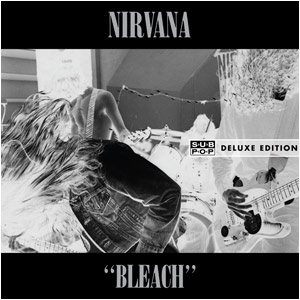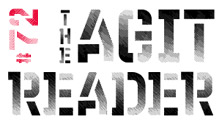
Bleach: Deluxe Edition
Sub Pop
It’s hard to believe that it’s been 20 years since the release of Nirvana’s debut, Bleach. Tossing hindsight away, it’s even harder to believe that this was to be the band that would change the music industry (for better and/or worse) by bringing the underground to the surface. (Though, as is often overlooked, Jane’s Addiction and the Red Hot Chili Peppers had already started paving the way for such a thing to happen.) I can recall procuring a copy of The Grunge Years, Sub Pop’s “limited edition” sampler that came out early in ’91 (before the release of Nevermind) after having been turned on to Mudhoney and Tad by a college pal. I don’t remember being struck by Nirvana’s contribution (“Dive”) in the slightest, so that when “Smells Like Teen Spirit” was suddenly everywhere, it was as if I had never laid ears on the band before.
Listening to the 13 tracks that make up Bleach (gloriously remastered for the anniversary edition by original producer Jack Endino), I’m torn. There’s no reason why this band should have become what it would become—this is an achingly aggressive and muddied affair that could never have the commercial appeal of Nevermind——but the album hits with such a hard combined thud that it’s easy to prefer it over the more palpable record that would make Nirvana millions. One can go on and on about Kurt Cobain’s damaged psyche and self-admonishment, but circa Bleach, it was irrelevant as he and his band were just another bunch of Northwestern losers creating bruising noise like their lives depended on it.
Bleach begins with a simple throbbing bassline from Chris Novoselic as “Blew” dives headlong into a sludgy morass. The song seems now—as it did then—to be cut from the same flannel cloth of Sub Pop’s bread and butter. So too with “Floyd the Barber,” with Dale Crover (of luminaries the Melvins) laying down a beat that lacks complexity but not effectiveness. Nirvana’s star starts to shine, however, with “About a Girl.” It is here that the template from which Nevermind would be cut emerges, a raspy rumination stapled to a fuzzy melody and a handful of chords. It has the wisp of regret and the angst-filled growl that would become Cobain’s calling card.
It is, however, on the next cut, “School,” that Bleach hits it stride. Here, Cobain and crew (Chad Channing was on drums at this point, not Dave Grohl), siphon punk’s aggression through the metallic drone of Sabbath, making for a heavy sound flailing with undirected energy instead of simply posing bad-ass. “Negative Creep” is the purest distillation of this formula, a repeated refrain and riff hammering home a mantra brimming at once with bile and disdain. “Scoff” similarly synchronizes the beat and guitar lick into one pounding force. From there the album deconstructs, each track disseminating the album’s varied pieces: “Mr. Moustache” has hardcore’s three chords and clouds of dust; “Sifting” is a metallic dirge; and “Downer” imbibes in out-there weirdness.
While it’s enjoyable to merely re-encounter Bleach, this time with vastly improved fidelity, it is also the second half— a live recording done in Portland, Oregon in 1990—that makes this edition invaluable. While much of Bleach is represented, there’s also a intense version of “Dive” and an early cover of the Vaselines’ “Molly’s Lips.” The lesser known “Sappy,” another song that seems a precursor to the sound Nirvana would perfect later, is also included. It’s a set worth hearing, especially for those who never caught the band on stage. But this edition’s added material and improved sound are only part of the reason for checking this out. Bleach is a neccessary listen, if only to glean the sound of this revered band coming into its own, sometimes for several cuts in a row, other times, for just a few notes. It’s an album that shows where Nirvana came from before going so far, only to be cut short.
Stephen Slaybaugh
MP3: “Scoff (Live)”
PAST PERFECTS
Fela Kuti, The Best of the Black President
Siouxsie and the Banshees, Juju
Gary Higgins, Seconds
Where the Action Is! Los Angeles Nuggets 1965-1968
Big Star, Keep an Eye on the Sky
Sunny Day Real Estate, Diary and LP2
The Feelies, Crazy Rhythms and The Good Earth
Thrasher Magazine's Skate Rock Volume 1
39 Clocks, Pain It Dark
The Stone Roses, The Stone Roses
The Jayhawks, Music from the North Country
Ze 30: Ze Records 1979–2009
24-Carat Black, Gone: The Promises of Yesterday
Beastie Boys, Ill Communication
